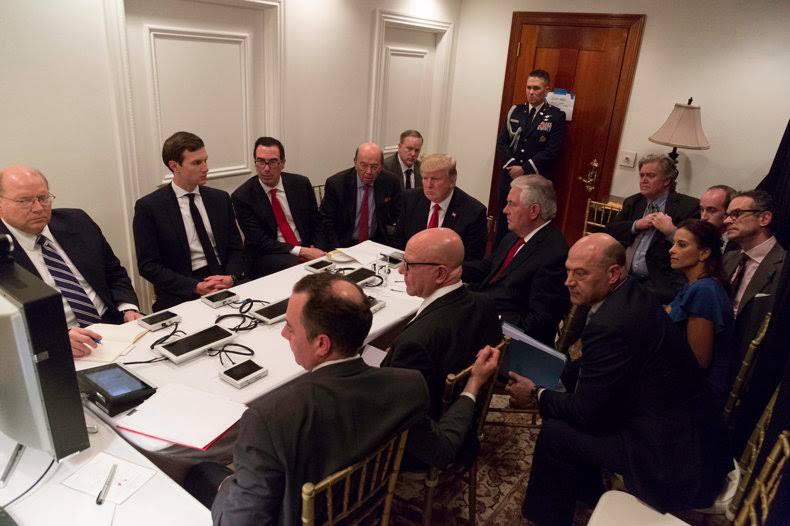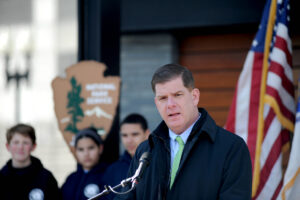100 Days of President Trump

“This is more work than in my previous life. I thought it would be easier.”
— President Donald J. Trump, April 27, 2017
President Donald J. Trump was inaugurated at noon on January 20, 2017. Since then, the progress and actions under his administration have been scrutinized with a microscopic lens. Saturday, April 29th, marked his 100th day in office. What have been the successes and failures of the administration in this amount of time?
January
- On January 20th, President-elect Donald John Trump, Sr., was sworn in as the 45th President of the United States, succeeding 44th President Barack Hussein Obama. That same day, the following cabinet members — and Marine Corps veterans — were confirmed by the Senate: General James Mattis as Secretary of Defense (98–1) and former General John Kelly as Secretary of Homeland Security (88–11). The former is a tried and true military man with 44 years of experience, including leading U.S. Central Command from 2010–2013 and leading military forces in Afghanistan and Iraq. The latter has 40+ years of military experience such as commanding U.S. Southern Command (including Guantanamo Bay) and being a former liaison to Congress.
- President Trump signed 7 Executive Orders between January 20th and 30th: Minimizing the Economic Burden of the Patient Protection and Affordable Care Act Pending Repeal; Expediting Environmental Reviews and Approvals For High Priority Infrastructure Projects; Enhancing Public Safety in the Interior of the United States; Border Security and Immigration Enforcement Improvements; Protecting the Nation from Foreign Terrorist Entry into the United States; Ethics Commitments by Executive Branch Appointees; and Reducing Regulation and Controlling Regulatory Costs
- On January 28th, President Trump released a presidential memorandum that outlined the organization of the National Security Council (NSC) and the Homeland Security Council (HSC). This restructuring added White House Chief Strategist Steve Bannon, a founding member and former executive chair at Breitbart News, to the NSC while removing the Director of National Intelligence and the Chairman of the Joint Chiefs of Staff as regular attendees of the Principals Committee (PC). Despite Bannon’s service record, this restructuring received bipartisan criticism, most notably from 2008 Republican presidential nominee Senator John McCain of Arizona.
- On January 29th, Trump authorized a joint US-United Arab Emirates military raid on an al Qaeda compound in Yemen. The raid resulted in the deaths of 23 civilians. Chief Special Warfare Operator William Owens, a member of US Navy SEAL Team Six, was also killed in the raid; three others were injured. The target, Qassim al-Rimi, is still at large.
- On January 30th, acting Attorney General Sally Yates directed the Justice Department not to comply with the President’s January 27th executive order calling for a temporary travel ban on citizens from seven countries in the Middle East; she was fired on January 31st, and Dana Boente replaced her until Senator Jeff Sessions took office.
- Elaine Chao was confirmed as Secretary of Transportation (93–6) on January 31st. Chao previously served as Labor Secretary for both of George W. Bush’s terms in office, she was also Deputy Secretary of Transportation during Bush’s first term. Chao faced little opposition, with the only potential cause for criticism being that she is married to Senate Majority Leader Mitch McConnell.
February
- Trump signed 8 Executive Orders between February 3rd and 28th: Core Principles for Regulating the United States Financial System; Task Force on Crime Reduction and Public Safety; Preventing Violence Against Federal, State, Tribal, and Local Law Enforcement Officers; Enforcing Federal Law with Respect to Transnational Criminal Organizations and Preventing International Trafficking; Providing an Order of Succession Within the Department of Justice; Enforcing the Regulatory Reform Agenda; Restoring the Rule of Law, Federalism, and Economic Growth by Reviewing the “Waters of the United States” Rule; and The White House Initiative to Promote Excellence and Innovation at Historically Black Colleges and Universities.
- On February 1st, former ExxonMobil CEO Rex Tillerson was confirmed as Secretary of State (56–43). Tillerson has only ever worked for ExxonMobil before his nomination, making him a target for critics citing his lack of political experience. However, greater scrutiny was placed on him due to potential ties to Russian President Vladimir Putin, with whom the new Secretary of State has a previous working relationship; Putin granted him the “Order of Friendship,” one of Russia’s highest honors, in 2013. Supporters saw this as a diplomatic advantage while critics considered it a liability and potential conflict of interest. This was significant due to the increased media focus on Russian interference in the 2016 election, a story that dates back to October.
- On February 3rd, a Seattle Federal judge had successfully halted the President’s January 27th travel ban, calling into question its legality. On February 9th, the 9th Circuit Court of Appeals ruled in favor of the Seattle judge, who had since been joined by a judge in Minnesota. The ban was halted indefinitely.
- Betsy DeVos was narrowly confirmed on February 7th as Secretary of Education (51–50). DeVos faced staunch opposition, forcing Vice President Mike Pence to break the tie for her confirmation, marking the first time this has ever occurred for a Senate confirmation hearing. DeVos’ critics cited her lack of educational experience, support for charter schools, and her overall answers to questions during her hearing as causes of concern.
- Senator Jeff Sessions of Alabama was confirmed as Attorney General on February 8th (52–47). Sessions has been active in the public sphere since 1981, and a member of the Senate since 1997. Critics considered him a controversial choice, however, due to claims of racial bias, including a scathing letter from civil rights activist Coretta Scott King opposing his nomination as a federal judge in 1986. This letter was read by Massachusetts Senator Elizabeth Warren during his confirmation hearings, leading to a warning from Senate Majority Leader Mitch McConnell. “Nevertheless, she persisted,” prompting him to remove her from the hearing.
- Representative Tom Price of Georgia (6th District) was confirmed as Secretary of Health and Human Services on February 10th (52–47). Price has served in Congress for twelve years prior to his confirmation, including serving as the chairman of the House Budget Committee. Price was also a staunch opponent of Obamacare, falling in line with the president’s views on the law.
- On February 13th, National Security Adviser Michael Flynn resigned from his position amidst reports that he had misled Vice President Mike Pence and other officials regarding his contact with the Russian ambassador to the United States. Unlike Secretary Tillerson, the election story with Russia called Flynn’s actions into greater concern. Flynn was replaced by acting Adviser Keith Kellogg until February 20th, when Lt. General H.R. McMaster was appointed. McMaster was later confirmed on March 15th (86–10), but remains on active duty.
- February 13th also saw the confirmations of former Goldman Sachs banker and film producer Steven Mnuchin as Secretary of the Treasury (53–47),as well as Dr. David Shulkin as Secretary of Veterans Affairs (100–0) . Aside from his previous Wall Street and Hollywood experience, Mnuchin also served as the national finance chair for the Trump campaign. Dr. Shulkin, on the other hand, served as the under secretary of health at the VA under the Obama administration.
- Andrew Puzder, Trump’s initial nominee for Secretary of Labor, withdrew his nomination on February 15th. Puzder had faced extensive criticism, including from Breitbart News, over his employment of illegal immigrants and his less-than-stellar business record.
- Wilbur Ross was confirmed as Secretary of Commerce (72–27) on February 27th. Ross was the CEO of Rothschild, Inc. for 25 years prior to his nomination.
March
- The President signed 8 Executive Orders between March 6th and 31st: Protecting The Nation from Foreign Terrorist Entry Into The United States; Comprehensive Plan for Reorganizing the Executive Branch; Revocation of Federal Contracting Executive Orders; Promoting Energy Independence and Economic Growth; Establishing the President’s Commission on Combating Drug Addiction and the Opioid Crisis; Omnibus Report on Significant Trade Deficits; Providing an Order of Succession Within the Department of Justice; and Establishing Enhanced Collection and Enforcement of Antidumping Countervailing Duties and Violations of Trade and Customs Laws
- Representative Ryan Zinke of Montana (at-large District) was confirmed as Secretary of the Interior (68–31) on March 1st. A former member of U.S. Navy SEAL Team Six, Zinke served 20 years in the military and was beginning his second term as Representative when he was nominated.
- 2016 Republican presidential candidates Dr. Ben Carson (58–41) and former Texas Governor Rick Perry (63–37) confirmed, respectively, as the Secretary of Housing and Urban Development and Secretary of Energy on March 2nd. Perry served as the Governor of Texas from 2000–2015, and ironically pushed to eliminate the very department he now heads in a 2011 Republican debate. Dr. Carson, on the other hand, simply confounds supporters and critics alike. Despite running for president, the Johns Hopkins M.D. expressed in November that he “has no government experience,” and turned down a cabinet position on the basis of not wanting to “take a position that could cripple the presidency.”
- On March 6th, the House Ways and Means Committee released legislation intended to repeal and replace the Affordable Care Act (ACA) — also known as “Obamacare”. The committee prepared for this after passing a resolution on January 13th. The Congressional Budget Office (CBO) reviewed the legislation and released their report on March 13th. They came to the conclusion that, while costs would eventually fall under the new law, 14 million more people would be uninsured than under the ACA. The report also detailed a trend that the number of uninsured people would continually rise each year at a higher rate than under Obamacare, weakening support for the bill by Republicans and Democrats alike. At House Speaker Paul Ryan’s request, the bill was pulled on March 24th before being voted upon.
- On March 7th, Trump’s revised travel ban was challenged by a federal judge in Hawaii. The next day, a Maryland judge joined the opposition to the ban. This ban, which eliminated Iraq from the list of banned countries and allowed green card holders and legal residents to enter the United States, was halted on March 15th.
- On March 28th, the House of Representatives voted to allow internet service providers (ISPs) the right to use and sell their customers’ browsing habits and history without express consent. This was in direct opposition to previous Federal Communication Commission (FCC) rules that would have required consent from the consumers. The rules were set to take effect at the end of 2017.
April
- President Trump signed 7 Executive Orders between April 18th and 28th: Buy American and Hire American; Identifying and Reducing Tax and Regulatory Burdens; Promoting Agriculture and Rural Prosperity in America; Review of Designations Under the Antiquities Act; Enforcing Statutory Prohibitions on Federal Control of Education; Improving Accountability and Whistleblower Protection at the Department of Veterans Affairs; and Implementing an America-First Offshore Energy Strategy
- On April 4th, Trump revised his January memorandum and removed Steve Bannon from the National Security Council. He also reinstated the Director of National Intelligence and the Chairman of the Joint Chiefs of Staff as regular attendees of the Principals Committee.
- On April 6th, the President authorized the launch of 59 cruise missiles on a Syrian military air field which hit around 3 am (local time in Syria) on April 7th. The site was said to be the source of a chemical weapons attack conducted on Syrian civilians two days prior. The missile strike was supported by many, including former Secretary of State and 2016 Democratic presidential nominee Hillary Clinton. Russian president Vladimir Putin, however, condemned the strike, saying it violated international law. Notwithstanding, the base was operational again within a day.
- A U.S. Navy strike group allegedly made its way toward the Korean Peninsula on April 9th in response to recent missile tests from North Korea. While the President said he was sending an “armada,” by the next week it was revealed that the ships were spotted in the Indonesian strait, which was south of the Peninsula.
- On April 13th, President Trump authorized the use of the largest non-nuclear bomb in existence — dubbed the “mother of all bombs” — on caves housing Islamic State (ISIS) militants in Afghanistan. According to Afghan officials, the assault killed at least 94 members of ISIS, including four commanders.
- Former Georgia Governor Sonny Perdue was confirmed as Secretary of Agriculture on April 23rd (87–11). Perdue served two terms as Governor of Georgia before his nomination.
- Alexander Acosta, a former member of the Justice Department under George W. Bush and Trump’s replacement for Puzder, was confirmed as Secretary of Labor (60–38) on April 27th, completing the cabinet of the Trump administration. Due to his previous experience, this marked Acosta’s fourth successful Senate confirmation.
So there you have it. In his first 100 days, President Trump managed to get his entire cabinet confirmed, signed 30 executive orders, and took several military actions, particularly in the month of April. As of day 100, FiveThirtyEight estimated the president’s approval rating to be roughly 42%. Does this mean he is doing a bad job? Not necessarily. At best, it means a majority of people do not think he is doing a good job. Whether or not you support him, it is hard to deny that President Trump’s first 100 days have been anything short of eventful.
Want to keep up with Rising Young MindS? Please Like us on Facebook or Follow us on Twitter!



